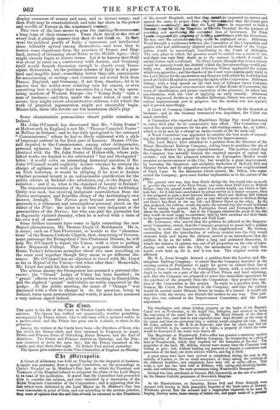Arbitrary government has again been disturbed in Italy by armed
revolt ; and crude conspiracy has again been crushed by Arbitrary government has again been disturbed in Italy by armed revolt ; and crude conspiracy has again been crushed by
the discip'ine and organization of the constituted authorities. There have been the usual attempts to suppress and garble ac- counts of the facts ; and, imperfectly as the tale has reached us, it is very probable that we know more about it in London than any on the spot except the actual combatants. There were fea- tures in the outbreak calculated to cause very reasonable alarm. It occurred in the territories of the Church, at Bologna and others of the Legations towards the Eastern side. Among the larger states of Italy, the Papal dominions have been conspicuous, espe- cially of late years, for the vexatious rigour of the rule and the strenuous effort to keep down everything that could advance opi- nion. Railways must not enter his Holiness's domains, lest knowledge should run like electric fluid along the iron. The Sovereign and his subordinates of the Government live in con- stant dread—the chronic disease of tyrants : they dread the in- tercourse of brisk traffic, lest people talk ; they dread the landing of penniless refugees upon the coasts; they dread the entrance even of a bit of paper, and copies of this journal have been muti- lated. Yet all their precautions avail not for safety. Refugees have landed on the coast, at Rimini—have gained possession, have loosed the political prisoners, have been joined by the garri- son: other towns have risen; and although the insurrection has been put down, the rioters routed and dispersed or seized, the other states of Italy are thrown into alarm.
And we say, well they may be. What does this very insur- rection disclose to us? A government so conscious of weakness as to live in fear of every vagabond that shows his face on its frontier, lest he tell something to the people ; the most intelligent part of the people, the real moral strength of a nation, ashamed of their government and desiring change ; an army in which disaffection has much extended ; and political prisoners in the gaols. The Journal des Debats takes a review of the attempted revolts in Italy since 1830, and censures the conspirators for pro- voking disorders which end in nothing but the sacrifice of so many individual victims. The French politician counsels admi- nistrative reforms instead of revolutions. The Morning Chronicle is scandalized= at the "false and heartless" account of the Journal; and imputes the failure of the "noble struggle" waged by the Italian patriots in 1830 and 1831 to the duplicity of France, which used Italy until she had achieved her own ends,— especially the recognition of the Orleans dynasty. by Naples and Sardinia,—then broke her promises of support, and has now mar- ried one of her Princes (Aumale) into the despotic house of Naples. There is truth in both views ; but as the truth is imper- fect, the effect of both views is false. The Journal des Debats is right in representing Italians, the servants of the several Govern- ments, as the real engines for oppressing Italy ; and the removal of those engines would be a great step towards the regeneration of the country. But how are Italians to obtain administrative re- forms, which would remove those who are so convenient in keep- ing things as they are ?—by simply asking for it? In fact, they will not obtain it until they can enforce it. On the other hand, the Journal des Debats is right in saying that the revolts have had no result but the immolation of victims. They have been concocted with a view to the past rather than the present. In Italy, society may be divided into three classes ; of which one is the immense number of persons interested in keeping up the existing order of things, because it suits their personal inte- rests, or accords with that grovelling servility that 'distinguishes the worst side of the Italian character : to this class belong the officials, the clergy, the army. A second class is the great mass of the people; too easy in the wealthier districts, too miserably poor in the remoter, and too ignorant in all, to have any political views whatever : they just obey what is decreed, and think no more. The third class is the class of politicians ; consisting of the better order of the middle classes, of still more among the nobility, and therefore including also some few military : their politics are eminently literary and scholastic ; they dream of Re- publicanism in ancient Rome, of popular power in the cities of the Middle Ages; and it will be observed that all their conspira- cies are based upon the notion of raising the people. They might as well try to raise the goats or the vine-stocks. It is clear that if they want to redeem their country, they must do it themselves, or if with help, not with that of the servile herd. If they would contend with established power, they must do it with powers under their own control, and not wait for the substantive action of the people, to be awakened at their bidding. A successful revolt in Italy must be in its nature aristocratic—a revolt of the gentry. It must be maturely organized, and supported by funds for paying armies, instead of expecting to find the people forming into armies for " love ": only brigands and such persons among the common people will revolt on speculation. The gentry of Italy must place themselves in a position to take counsel together, to
display resources of money and men, and to dictate terms; and then Italy may be renationalized, and take her share in the power and wealth of Europe in the nineteenth century.
This view of the case seems to give the existing Governments a long lease of their tenements. From their dread at 011ie stirof every leaf, it plainly appears that they do not think so. In feet, were the political gentry of Italy, a numerous and intellectual class, tolerably agreed among themselves,—and were they to borrow some experience from the practices of France and Eng- land, instead of dreaming about Rome or the Middle Ages,—they might already begin to dictate terms. Let it be known that Italy was about to enter on a controversy with Austria, and Germany itself would furnish discussion enough to absorb every Trans- alpine Metternich ; let the political scheme of Italy be of a prac- tical and tangible kind—something better than idle conspiracies for assassinating or rioting—and volunteer aid would flock from France, England, and Germany, if not from America; let it be known that the nobles were counting coin for armies, or even consulting how to pledge their resources for a loan in the specu- lating markets of Western Europe—let "Young Italy" turn a man of business—and then, under the mere terror of such ru- mours, they niight extort administrative reforms, with which the work of practical regeneration might not unsuitably begin. Meanwhile, these idle revolts are but murderous child's play.



























 Previous page
Previous page